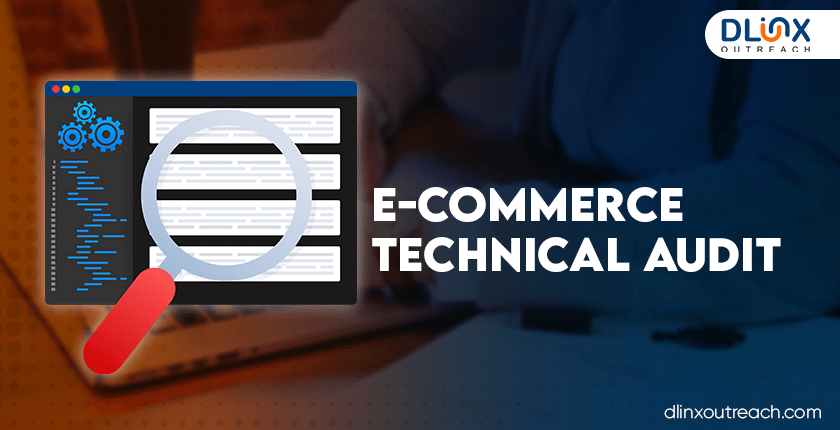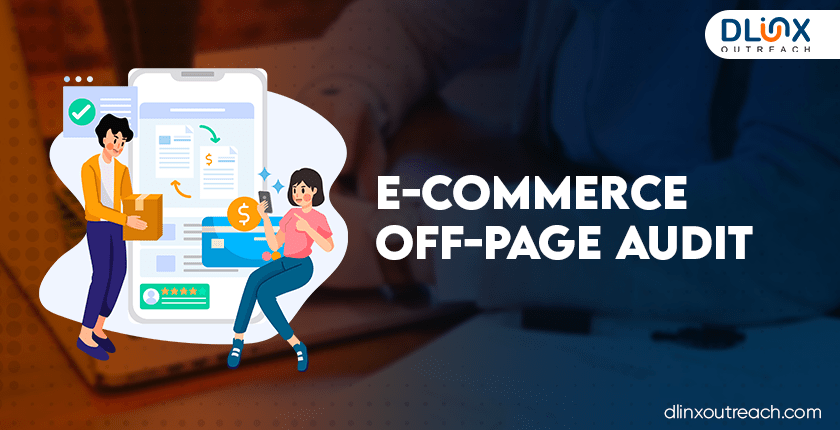Since the Covid19, the dynamics of commerce have changed a lot. Every brand, smaller or larger, local or global and B2B or B2C has its online store. Hence, the importance of E-commerce SEO has increased manyfold.
Presently, people are more comfortable purchasing online rather than physically. It is a win-win situation for both parties. Customers save time and traveling, and companies save the expenses of managing physical stores.
Whatever your E-commerce business is, it requires SEO optimization to compete in the search engine result pages. So, to appear at the top, businesses need to work on their websites or landing pages to be more user-friendly.
The working of an E-store is different from a general informational website, as the former has more imagery, less text, and dynamic URLs. So, SEO experts need to work hard to make it complete at the SERPs.
Following are some of the checklists that must be carefully audited to make your E-store more profitable.
Read | Free SEO Audit Tools List
E-commerce Technical Audit

1. Site Search
Every store offers a site search. This internal search looks into your website and portrays the product range based on the keywords.
While auditing make sure that your internal search corresponds to the entered keywords. Wrong search results will frustrate the visitors. So, optimize your website’s search for the most suitable results.
2. URL and Canonicals
Make sure that you have a unique URL for your website and does not contain the full titles, characters and dates, as these will make them long and fizzy. So, assign a short, keyword-oriented and relevant URL to folders and directories.
E-stores face another challenge in that their URLs are dynamic and that also keep on adding and removing as the new products add and old products are removed. Furthermore, the same product might also have different URLs as the same product might appear in different sections.
This issue can be tackled by putting a self-referencing canonicals tag on the pages you want to index. All other pages must point to the original URL. Make sure one product does not have two canonical tags, as it is confusing Google in indexing.
3. Sitemap
Sitemap helps the crawlers to index the websites and their pages easily and quickly. It’s like a table of the contents of your website. Your XML sitemap or robot.text file helps the crawlers. It guides the crawlers to know which of the pages, domains, and directories to index.
Make sure that only the main pages are presented in the sitemap that also have clean URLs. So, while auditing make sure that these files are presenting the right information to the crawlers, otherwise, your pages might not appear in the SERPs.
4. Globalization
If you are operating globally then another SEO challenge that you would face is to offer the same product in different languages and different URLs.
So the best way to tackle this challenge is to use the “hreflang tag”. This tagging will help Google spiders to categorize the local version of URLs. While auditing make sure that hreflang is directed to the right URL, which is also indexable.
Read | Cheapest Ways to Drive Traffic to a Website
5. Loading Time
Loading time is very important, as visitors will switch to the other options if the loading time is more than 2 seconds. So, make sure your website is super fast and its images are well-optimized to appear fully and quickly.
E-store has a lot of images and sometimes 3 to 4 images of a single product as well, so make sure that it does not slow down the website. The HTML coding, flashy items and more many widgets also slow down your website. So optimize every aspect while auditing to get quick loading.
6. Navigation
A seamless navigation is required in the E-stores, as one has to go multiple levels before reaching the desired product. For example, while searching for Mensb brown leather shoes of size 42, one may have to navigate like www.website.com/ Mens/Shoes/leather-shoes/Brown/42//FB7497-010. So there are many levels and each level should be workable and give the the required information.
7. Crawling and Indexing
Your website will not appear in the SERPs until they are crawled and indexed properly. Sitemap and robot.txt plays a very important role in indexing pages along with other parameters.
While auditing make sure that your pages are indexed for the relevant keywords, if not check your sitemap, meta titles, description and keywords. Wrong indexing will lead to noninterested traffic which will not convert.
8. Page Speed
The speed of the pages of a website can differ by a great margin, as different products have different descriptions and also different numbers of pictures. So, it is necessary to check the speed of each page and take corrective actions accordingly. Low speed means the page is not opening, reducing the user experience and conversion.
9. Pagination
Pagination is the stacking of products of the same category. For example, while looking for a product in a store, you might get multiple pages of the same product. Make sure that these pages are not “noindex tagged”, as bots will not index them then. Such tagging will not show your full product range in the listing.
The picture below shows the page 1 of the internal search of “running shoes” ad Adidas.

10. Mobile Optimization
Google penalizes those websites that are not mobile-friendly and this becomes even more important for E-stores, as the majority make purchases using their mobile these days.
Make sure while auditing that your website is optimized for mobiles and other devices. One do not have to zoom in and out to read and see images and videos.
Read | How To Increase Website Traffic from Zero
E-commerce Content Audit

Apart from your product, the E-store also offers blogs, meta descriptions, technical information, and product descriptions. So, such content must also be SEO-optimized for better performance. Following are some of the parameters that must be audited regularly.
1. Keywords Performance
First of all, find the relevant keywords of your niche by using SEO tools and then use them in your content. After using, check whether these keywords are pulling traffic to your website or not.
Moreover, also make sure that your used keywords are according to the intent of the search. It is also recommended to use the long tail keywords in your content to appear more often in the search.
It is also possible that keywords might change because an item might get changed as the same item might get viral with a different keyword so, auditing can help you to adapt new keywords. While auditing make sure that your content are not stuffed with keywords and that they look natural in the content.
2. Internal Backlinks
Internal backlinks keep the visitor engaged and enhance the user experience, which in turn increases the ranking in SERPs. For, E-Store, keep presenting the links of similar items or matching items, when someone is purchasing.
It is also good to keep the links to the deals at the bottom of all pages to keep your customers interested and purchasing more. So during the audit measure the effectiveness of internal backlinks by analyzing the number of clicks of a visitor after visiting the home page of a website. The figure below is one of our blogs, showing the internal backlinks.

3. Meta Titles
Titles of the pages are very important as Google looks very closely at the titles while indexing. During the audit check that the length of the titles remains within the limits that is 50 to 60 characters and that they are keyword-oriented.
4. Meta Description
The meta description appears below your title in the SERPs. This is a short paragraph comprised of a maximum of approximately 160 characters, showing the description of the page. Make sure that the description is short, relevant, keyword oriented and should entice the reader to visit the page for the purchase or further information.
The figure shows the description of Moz, when I searched the Moz.

5. Duplication
Duplication is a common issue in E-commerce, as you might have the same product in a different group. If you have leather shoes in your product then it will appear in the Men’s section and also in the dress shoes section.
So, during the coding make sure that these pages are not indexed in the different URLSs. So, one can use the noindex tags, sitemap, and robot.txt files to help Google to properly index.. You may also avoid duplication by using unique long-tail keywords in the description, FAQ sections, reviews, star ratings and things like that.
Read | What Is The Importance Of Updating Website Content
6. Broken Links
Broken links is another big issue in websites and E-stores experience these more than often, as they take down items of old season and also out-of-stock products. Make sure that all of these links are properly removed from your store or replaced with new and relevant products. Google is very strict against broken links, as they negatively impact the user experience.
7. Page Performance
During the audit, do check the performance on a page-to-page basis, as content differs by a great margin on pages in the E-store. Check the parameters like sales, traffic and conversion ratio of every page to optimize it accordingly. If they are not improving, then check their descriptions and indexing.
8. Structuring
Structing your data in a proper format helps the search engines crawl and index your pages quickly and in the relevant fields. So, taking help from Schema Markup is essential in E-stores. It helps the Google spiders to classify the pages.
The more relevant markup for the E-store is a product and the breadcrumbs, where the former helps to categorize the product range and the latter to index the page product pages.
9. Cannibalization
As said earlier, cannibalization is a common problem in the contents of the E-store. For example, if you just describe a product sweatshirt, then all of your sweatshirts will start competing with each other.
So one may differentiate them like “lightweight sweatshirts”, “cotton sweatshirts”, “quick-dry sweatshirts”, “Green quick dry sweatshirts” and so on. So, using more descriptions or long tail keywords could be very effective in categorization and avoiding self-competition.
10. No-Follow Backlinks
Comments or review sections are open in the E-stores and people might take advantage of this by posting their spammy backlinks, which could hurt your ranking in the SERPs.
Hence, tag all of these sections as no-follow so that Google does not consider them in its ranking process. It is also necessary to remove such links from time to time to avoid penalties from search engines.
Read | What are Contextual Backlinks and How to Create Them
E-commerce off-Page Audit

1. Backlinks
Backlinks are the backbone of your website’s ranking as they show the credibility of a website. More backlinks mean more credibility and more credibility means a high ranking in the SERPs. So, try to get the backlinks and measure their performance as well by looking at the traffic coming from them.
One can also purchase backlinks, which is quite common in SEO in the present era, though Google does not endorse such activity and penalizes the website if found. So, if you still want to purchase backlinks make sure that these look relevant and organic also make sure that you are not getting too many links from the same domain.
2. Referring Domains
While auditing, it is also necessary to check the ranking and relevancy of the referring domains. A high-ranked referring domain has more credibility than a low-ranked site. Similarly, a relevant website is more suitable than an irrelevant website. So, make sure you get backlinks from high-ranked relevant websites.
3. Spam Score
The spam score of a website describes the spammy backlinks. A higher score means higher spammy websites like gaming and porn are linking to you, which is detrimental. Since such websites offer backlinks at a very cheap rate, SEO personnel are often lured to them. These links might give a flux of traffic initially, but it is detrimental in the long run and hurt your ranking. So, immediately remove such links to avoid penalties from Google.
Conclusions:
Creating a website is not enough for the visibility of your E-store. You need to SEO optimize your website to appear and rank higher in the SERPs and the story does not stop here. You need to keep auditing your website at a regular interval to see the performance of your SEO efforts. Following are some of the checklists for the auditing of your website.
- Keep checking the performance of your keywords on different pages.
- Keep checking the page-to-page performance, speed and loading time.
- Keep checking the performance of your backlinks and also analyze the referring domains for better results.
- Keep checking your spam score to tag those links as nofollow to avoid penalty.
- Make sure that your URLs are properly tagged and indexed.
- Make sure that your URL for multiple languages is hreflang tagged.
- Make sure your sitemap and robot.txt files are working and contain the right data.
- Make sure that your structure, meta title and descriptions are properly placed and written in accordance with the keywords.
- Avoid content duplication and cannibalization by properly tagging your pages.
Auditing is a specialized job, which requires expertise in multiple trades, which are hard to learn. Dlinx Outreach is an SEO agency that has a penality of expertise in designing SEO strategies and they audit them according to their performance. Our team is comprised of expertise, which can handle E-stores as well. Please feel free to contact us for further information.
Frequently Asked Questions
What is technical auditing of a website?
Technical auditing deals with the technical aspects of the website, which are not visible to the public like loading speed, internal search, mobile effectiveness and many more.
What is the auditing of content?
The performance of content is linked to content auditing. It shows the performance of your content in achieving a high ranking. Keyword performance, broken links and meta title, meta description, etc., come in this auditing.
What is off-page auditing?
In off-page auditing, we look for external backlinks, referring domains and spam scores.
How important is the auditing of a website?
Auditing is to evaluate the performance of your SEO efforts. You look at different parameters and then evaluate their roles in achieving a higher position in the SERPs. Auditing helps you to gauge the performance and alter it if required.
Can Dlinx Outreach help you to audit your website?
Dlinx is an SEO agency that has experience in formulating SEO strategies and then auditing them for better performance.
Related Articles:
- How Long Does It Take For Backlinks To Work
- On-Page and Off-Page Optimization In Digital Marketing
- Is SEO Better than Google Ads for Business
- What are the common SEO mistakes to avoid
- Mobile First vs Responsive Web Design
- How To Promote Your Business Locally
- Does Changing Hosting Affect SEO
- What is the Difference Between Brand Taglines and Slogans







